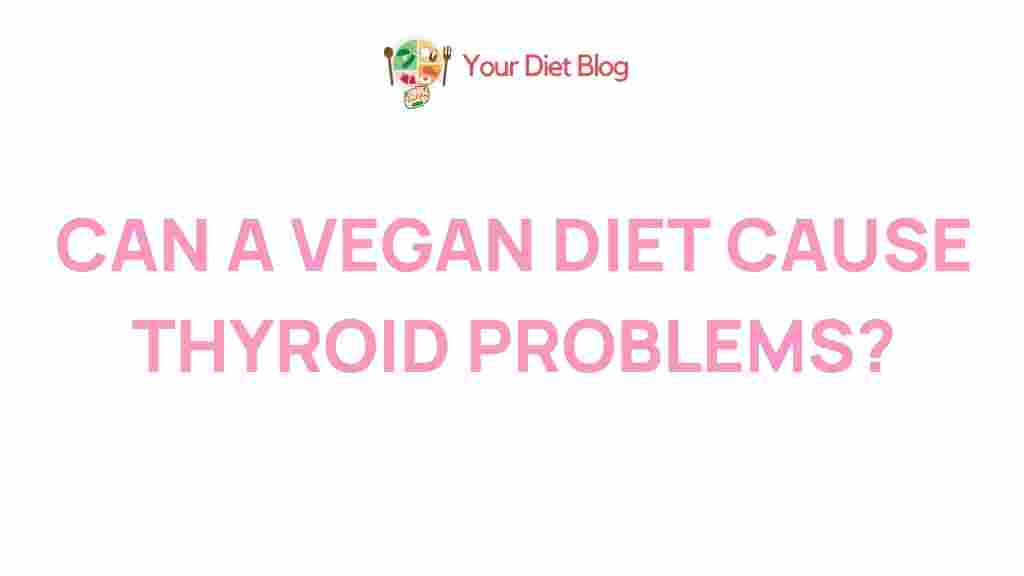The Vegan Diet: Its Surprising Impact on Thyroid Health
With the rise of plant-based living, many are embracing the vegan diet for its ethical, environmental, and health benefits. However, fewer people are aware of its intricate connection with thyroid health. Understanding this relationship is essential for those transitioning to or maintaining a vegan lifestyle. In this article, we’ll dive into how a vegan diet affects thyroid function, uncover potential pitfalls, and share actionable strategies to support optimal thyroid health.
What is the Thyroid and Why is It Important?
The thyroid gland is a butterfly-shaped organ located in the neck, playing a vital role in regulating metabolism, energy levels, and overall hormonal balance. It produces hormones like thyroxine (T4) and triiodothyronine (T3), which are crucial for body functions such as temperature regulation, weight management, and heart rate control.
Thyroid health can be influenced by many factors, including genetics, lifestyle, and, significantly, diet. As the vegan diet gains popularity, researchers and nutritionists are examining its unique impact on thyroid function.
How Does a Vegan Diet Influence Thyroid Health?
A vegan diet is entirely plant-based, excluding all animal-derived products like meat, dairy, and eggs. This dietary choice can impact thyroid health in both positive and challenging ways. Here’s a breakdown:
- Rich in Antioxidants: Plant-based diets are abundant in fruits, vegetables, nuts, and seeds, providing antioxidants that reduce inflammation and support thyroid function.
- Low in Saturated Fats: Avoiding animal products lowers saturated fat intake, which may improve overall hormonal balance.
- Potential Nutrient Deficiencies: Key nutrients like iodine, selenium, and zinc—critical for thyroid hormone production—are sometimes harder to obtain in vegan diets.
While the vegan diet offers significant health benefits, it’s crucial to address specific nutritional challenges to maintain a healthy thyroid.
Key Nutrients for Thyroid Health
Let’s explore the nutrients essential for thyroid function and how they relate to a vegan lifestyle:
- Iodine: The thyroid uses iodine to produce T3 and T4 hormones. Iodine deficiency is common in vegan diets because plant-based sources of iodine are limited. Seaweed, iodized salt, and iodine supplements can help bridge this gap.
- Selenium: Selenium supports enzyme activity that converts T4 to T3. Good plant-based sources include Brazil nuts, sunflower seeds, and mushrooms.
- Zinc: Zinc is essential for thyroid hormone synthesis. Vegans can get zinc from legumes, whole grains, and fortified foods.
- Iron: Iron deficiency anemia can impair thyroid function. Vegan sources of iron include spinach, lentils, and tofu, paired with vitamin C-rich foods for better absorption.
Potential Challenges of the Vegan Diet on Thyroid Health
Despite its advantages, the vegan diet poses some challenges that could impact thyroid health:
- Goitrogens in Plant Foods: Foods like soy, broccoli, and kale contain goitrogens, which may interfere with iodine uptake. While these foods are nutritious, consuming them in moderation is key.
- Insufficient Vitamin B12: Vitamin B12 deficiency, common in vegans, can indirectly affect thyroid health by contributing to fatigue and poor energy metabolism.
- Reliance on Processed Foods: Over-reliance on processed vegan foods can lead to nutrient imbalances, impacting thyroid function.
Practical Tips for Maintaining Thyroid Health on a Vegan Diet
To thrive on a vegan diet while supporting your thyroid, consider these actionable tips:
- Prioritize Whole Foods: Build your meals around nutrient-dense whole foods such as vegetables, legumes, whole grains, and nuts.
- Incorporate Iodine-Rich Foods: Add seaweed, iodized salt, or supplements to your diet.
- Monitor Selenium Intake: Include Brazil nuts or a selenium supplement in your daily routine.
- Be Mindful of Goitrogens: Cook goitrogen-rich foods like broccoli and kale to reduce their impact on iodine absorption.
- Supplement Wisely: Use fortified foods or supplements for vitamin B12, iodine, and other nutrients if needed.
- Stay Hydrated: Proper hydration supports overall metabolic and thyroid function.
How to Monitor and Troubleshoot Thyroid Issues
If you’re following a vegan diet and notice symptoms such as fatigue, weight changes, or mood swings, it’s essential to address them promptly. Here’s how:
- Regular Blood Tests: Monitor thyroid hormone levels (T3, T4, and TSH) with the help of a healthcare provider.
- Track Symptoms: Keep a journal of symptoms to identify patterns related to your diet or lifestyle.
- Consult a Dietitian: Work with a nutritionist familiar with plant-based diets to optimize your nutrient intake.
- Explore Supplements: Discuss the potential need for iodine, selenium, or other supplements with your doctor.
Resources for Vegan Diet and Thyroid Health
Looking for more guidance on balancing a vegan diet and thyroid health? Explore our comprehensive plant-based nutrition guide. Additionally, reliable sources like the NHS guide to vegan diets offer valuable insights for maintaining balanced nutrition.
Conclusion
The relationship between a vegan diet and thyroid health is complex yet manageable with proper knowledge and planning. By prioritizing key nutrients, being mindful of potential challenges, and seeking regular medical advice, you can maintain both your commitment to plant-based living and your thyroid function. Remember, a well-informed approach is the key to thriving on a vegan diet while supporting your body’s hormonal health.
This article is in the category Nutrition Basics and created by YourDiet Team
